|
Forum message title is informative and describes the main point in the analysis. More detailed summary is listed in bullets at the beginning: busy readers can read only this section and decide whether the document is worth reading.
The Ready-made graphs are extremely usefull and make the document more interesting to read. You may also build your tables and pictures.
The first section describes the main operations and strategy of the company. Focus on issues like market position, competitors and competitive advantages. It is not necessary introduce basic company background, the company description information should be filled in the Background section.
In this case, the analyst focuses on the most interesting and relevant things in the target company: foreign growth opportunities. The risks and opportunities are discussed.
Investors are always interested if target company has made some major acquisitions or changes in its operations. Issues like changes in financial position, synergies, possible one-off charges, accounting distortions, competitive issues and overall rationality of the acquisition should be discussed. Remember to adjust your model for the changes.
If possible, estimates should be compared with consensus and management guidance. If estimates are different from the two, the reasons should be justified clearly.
These kind of issues are very exceptional: the analysts expects substantial impairments that investors should take into account. These issues may be presented if reasons are justified.
Recommendation and target price (if given) are concluded clearly. To sum up, the whole document should be drawn up to support the recommendation.
Message: This is an example of initial forum message. It provides examples of what kind of things can be taken into account when writing forum comments. Please select back in your browser to return to the instructions.
| Demo Analyst |
| Jan 8, 2009 8:34 PM |
| Deteriorating market conditions put Stockmann at high risk: proof of profitable growth needed |
Following
starts with hold -recommendation: the Russian growth opportunities are
offset by the weak economic prospects: proof of profitable growth
needed
· Stockmann Group: cash generating established operations in
Finland, Sweden and Norway, growth seeking strategy in Russia and
Eastern Europe
· Lindex acquisition in 2007: debt-laden balance sheet due to
overpriced acquisition and current amount of goodwill exceeding equity
book value
· Introducing the Lindex concept in Russia has been slow so far
· Stockmann likely to take substantial impairment charges on goodwill reflecting the deteriorating market conditions
· Consumer demand in Russia has remain strong in spite of the economic turbulence until now
· Competitors postpone their investments in Russia: Stockmann might even be able to capitalise on the crisis
· Consensus has remained optimistic: Q4 performance likely to fall short of expectations
· Expected profit warning on Jan 8, several factors put pressure on margins
· Share price moderately valued: recommendation hold, target price 10.00 euros
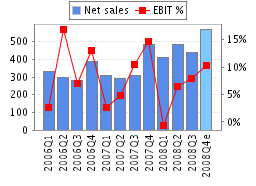 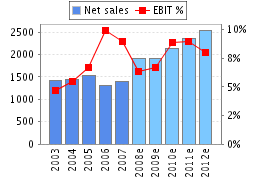
Strategy introduced
The group has its established operations in Finland, Sweden
(Lindex) and Norway (Lindex). Each area shows good profitability with
solid cash flows, but the growth potential is very limited. The
department store division has a strong market position and customer
loyalty in Finland: 65% of sales from loyal customers, 1 million loyal
customers in Finland.
The non-core mail order business Hobby Hall shows weak
profitability and declining sales, a unit likely to be divested in
future.
The Group seeks growth from the emerging markets of Eastern Europe
and Russia. The key of the growth strategy is to acquire strong
position in new shopping malls by having a department store, Seppälä
and Lindex under the same location. The successful customer loyalty
program is carried out also in the foreign markets with 0,7 million
loyal customers abroad currently.
Key competitive advantages: established operations, high customer
loyalty, strong profitability in Nordic market, long expertise in
Russian market (since 1989)
Key growth driver: Russian market
Stockmann has posted increasing sales in Russia in spite of the
financial turbulence, most likely because households in Russia have
little debt and their purchasing power is more dependent on employment.
However, I consider that the risk of collapse in consumer purchasing
power is significant if the Russian real economy follows the plummeting
oil price.
The operating environment in Russia is challenging but not as
difficult for operations categorised strategic by the government. Grey
economy, double invoicing, high import duties and litigations are main
concerns, Russian's WTO membership would make the situation better for
Stockmann.
Three reasons why the Group might be able to capitalise on the financial crisis in Russia:
1) local operators exit the market or face problems financing their
operations 2) unlike its local competitors, Stockmann is likely to be
more trusted by its suppliers, 3) competitors postpone their
investments in the market creating competitive advantage for Stockmann,
this advantage, however, might be offset by the weakening consumer
demand.
Lindex acquisition
Lindex is currently having a strong market position in its existing
markets that maintain a strong cash flow. The main driver for the
acquisition was to establish the Lindex concept in Russia by exploiting
Stockmann's experience in the market. Also, possible cost synergies
with Seppälä exist.
Proof of profitable growth needed
The Group now combined with Lindex is eager to expand in Eastern
Europe, Russia and even in Saudi Arabia. The acquisition that was
carried out at the peak of the cycle was substantially overpriced and
brings Stockmann's into much weaker financial position. In 2007
financial statements, Stockmann said it aims to open 20-25 Lindex
stores in Russia in 2008, so far only one has been opened.
Stockmann likely to take substantial goodwill impairment charge in Q4
Due to the EUR 850.9 million acquisition cost of Lindex, Stockmann
is currently carrying over EUR 800 million of goodwill in its balance
sheet. The debt financed acquisition put Stockmann into a much weaker
financial position (Q3 gearing 130%) and the company is currently
carrying a goodwill higher than its equity book value. In spite the
company has re-arranged its long-term financing (release 19.12.2008), I
am expecting that some of the Lindex goodwill is likely to be impaired
this year.
A quick back-of-the-envelope calculation shows this to us: the
recoverable amount (NPV) of Lindex exceeded the carrying amount (EUR
895 million) by EUR 73 million in Dec 31, 2007 impairment testing. The
applied discount rate (WACC) was 8.1%. Using Q3 figures, Lindex's
invested capital was EUR 987.4 million and 12 months rolling EBIT was
EUR 53.4 million, which yields a 5.4% ROIC. Since the current and my
estimated ROIC are clearly below the discount rate, the NPV of Lindex
is likely to not meet the current carrying amount in this year's
impairment testing. The probable impairment is not taken into my
estimates.
Q4 estimates: consensus looks too optimistic
I expect Stockmann's Q4 sales to decline slightly on y-o-y basis,
if Lindex consolidation is not taken into account. The sales reports
posted during Q4 indicate highest sales decline in department store
(approximately -7%) and Hobby Hall (approximately -10%).
My estimate for Q4 EBIT is EUR 58 million, lower than consensus (77
million) and in line with management outlook (lower than in Q4'07, 71
million) posted in the recent profit warning. I base my pessimistic
expectation on the following factors: 1) December sales report
indicates weaker sales, 2) Slomenskaya department store remains closed
3) devaluation of the rubble affects purchasing power of Russian
customers in both Finland and Russia 4) rapidly weakening consumer
demand in Finland has forced the stores to discount sales earlier than
usual. Also, the weakening sales currencies SEK, NOK put pressure on
margins and the erosion of krona-denominated loans will affect 2008
EPS.
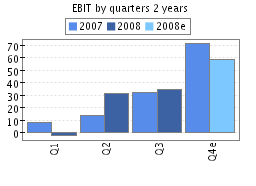 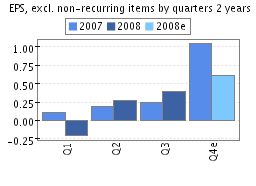
Management has not given outlook for 2009, my EBIT estimate ( EUR
123 million) is below consensus (EUR 147 million). I expect 2009 sales
to increase slightly supported by openings of new stores.
Conclusions
My estimates for 2010-2013 operating margin (8-9%) are clearly
below management target (12%). I remain cautious in the estimates due
to the possibility of a protracted recession in main markets and
failure of the leveraged acquisition-driven growth strategy. If the
targets are achieved, the share would appear to be extremely cheap. The
value of Russian growth opportunities is offset by the high risk for
impairment, rapidly weakening short-term prospects and the risk of
protracted recession. My recommendation is hold, target price at 10.0
euros.
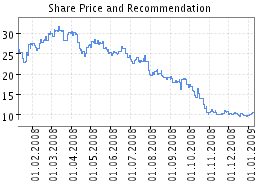 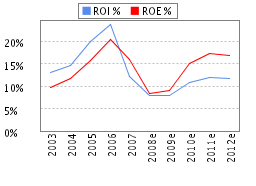 |
| Last edited on Jan 8, 2009 8:34 PM,
1 time(s) in total |
Reply to this message
Return to Forum
|







